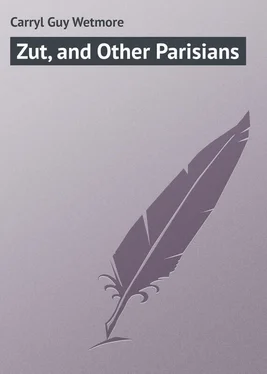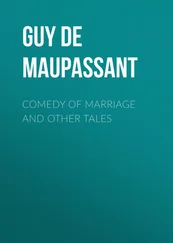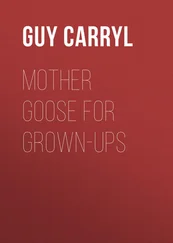Guy Carryl - Zut, and Other Parisians
Здесь есть возможность читать онлайн «Guy Carryl - Zut, and Other Parisians» — ознакомительный отрывок электронной книги совершенно бесплатно, а после прочтения отрывка купить полную версию. В некоторых случаях можно слушать аудио, скачать через торрент в формате fb2 и присутствует краткое содержание. Жанр: foreign_prose, на английском языке. Описание произведения, (предисловие) а так же отзывы посетителей доступны на портале библиотеки ЛибКат.
- Название:Zut, and Other Parisians
- Автор:
- Жанр:
- Год:неизвестен
- ISBN:нет данных
- Рейтинг книги:4 / 5. Голосов: 1
-
Избранное:Добавить в избранное
- Отзывы:
-
Ваша оценка:
- 80
- 1
- 2
- 3
- 4
- 5
Zut, and Other Parisians: краткое содержание, описание и аннотация
Предлагаем к чтению аннотацию, описание, краткое содержание или предисловие (зависит от того, что написал сам автор книги «Zut, and Other Parisians»). Если вы не нашли необходимую информацию о книге — напишите в комментариях, мы постараемся отыскать её.
Zut, and Other Parisians — читать онлайн ознакомительный отрывок
Ниже представлен текст книги, разбитый по страницам. Система сохранения места последней прочитанной страницы, позволяет с удобством читать онлайн бесплатно книгу «Zut, and Other Parisians», без необходимости каждый раз заново искать на чём Вы остановились. Поставьте закладку, и сможете в любой момент перейти на страницу, на которой закончили чтение.
Интервал:
Закладка:
She turned to Pierre suddenly, and buried her face on his shoulder.
" Je t'aime! " she whispered. " Je t'aime! "
The Next Corner
ANTHONY CAZEBY was a man whom the felicitous combination of an adventurous disposition, sufficient ready money, and a magnificent constitution had introduced to many and various sensations, but he was conscious that, so far as intensity went, no one of them all had approached for a moment that with which he emerged from the doorway of the Automobile Club, and, winking at the sting of the keen winter air, looked out across the place de la Concorde, with its globes of light, swung, like huge pearls on invisible strings, across the haze of the January midnight. He paused for a moment, as if he would allow his faculties to obtain a full and final grasp of his situation, and motioned aside the trim little club chasseur who stood before him, with one cotton-gloved hand stretched out expectantly for a supposititious carriage-check.
"Va, mon petit, je vais à pied!"
Afoot! Cazeby smiled to himself at the tone of sudden caprice which rang in his voice, and, turning his fur collar high up about his ears, swung off rapidly toward the Cours la Reine. After all, the avenue d'Eylau was only an agreeable stroll's length distant. Why not go home afoot? But then, on the other hand, why go home at all? As this thought leaped suddenly at Cazeby's throat out of the void of the great unpremeditated, he caught his breath, stopped suddenly in the middle of the driveway, and then went on more slowly, thinking hard.
It had been that rarissima avis of social life, even in Paris, a perfect dinner. Cazeby had found himself wondering, at more than one stage of its smooth and imposing progress, how the Flints could afford to do it. But on each recurrence of the thought he dismissed it with a little frown of vexation. If there was one thing more than another upon which Cazeby prided himself, it was originality of thought, word, and deed, and he was annoyed to find himself, even momentarily, on a mental level with the gossips of the American and English colonies, whose time is equally divided between wondering how the Choses can afford to do what they do, and why the Machins cannot afford to do what they leave undone.
People had said many things of Hartley Flint, and still more of his wife, but no one had ever had the ignorance or the perversity to accuse them of inefficiency in the matter of a dinner. Moreover, on this particular occasion, they were returning the hospitality of the Baroness Klemftt, who had, at the close of the Exposition, impressed into her service the chef of the Roumanian restaurant, and whose dinners were, in consequence, the wonder and despair of four foreign colonies. After her latest exploit Hartley Flint had remarked to his wife that it was "up to them to make good," which, being interpreted, was to say that it was at once his duty and his intention to repay the Baroness in her own sterling coin. The fact that the men of the party afterwards commended Hartley's choice of wines, and that the women expressed the opinion that "Kate Flint looked really pretty!" would seem to be proof positive that the operation of "making good" had been an unqualified success.
Now, Cazeby was wondering whether he had actually enjoyed it all. Under the circumstances it seemed to him incredible, and yet he could not recall a qualm of uneasiness from the moment when the maître d'hôtel had thrown open the doors of the private dining room, until the Baroness had smiled at her hostess out of a cloud of old Valenciennes, and said, "Now there are two of us who give impeccable dinners, Madame Flint." Even now, even facing his last ditch, Cazeby was conscious of a little thrill of self-satisfaction. He had said the score of clever things which each of his many hostesses expected of him, and had told with great effect his story of the little German florist, which had grown, that season, under the persuasive encouragement of society's applause, from a brief anecdote into a veritable achievement of Teutonic dialect. Also, he had worn a forty franc orchid, and had left it in his coffee-cup because it had begun to wilt. In brief, he had been Anthony Cazeby at his extraordinary best, a mixture of brilliancy and eccentricity, without which, as Mrs. Flint was wont to say, no dinner was complete.
But the sublime and the ridiculous are not the only contrasting conditions that lie no further than a step apart, and Cazeby was painfully conscious of having, in the past five minutes, crossed the short interval which divides gay from grave. Reduced to its lowest terms, his situation lay in his words to the little chasseur. With the odor of the rarest orchid to be found in Vaillant-Rozeau's whole establishment yet clinging to his lapel, Anthony Cazeby was going home on foot because the fare from the Concorde to the avenue d'Eylau was one franc fifty, and one franc fifty precisely ninety centimes more than he possessed in the world. For a moment he straightened himself, threw back his head, and looked up at the dull saffron of the low-hanging sky, in an attempt to realize this astounding fact, and then went back to his thinking.
Well, it was not surprising. The life of a popular young diplomat with extravagant tastes is not conducive to economy, and the forty thousand dollars which had come to Cazeby at the beginning of his twenty-eighth year had proved but a bad second best in the struggle with Parisian gayety. His bibelots, his servants, Auteuil, Longchamp, his baccarat at the Prince de Tréville's, a dancer at the Folies-Marigny, Monte Carlo, Aix, Trouville, – they had all had their share, and now the piper was waiting to be paid and the exchequer was empty. It was an old story. Other men of his acquaintance had done the same, but they had had some final resource. The trouble was, as Cazeby had already noted, that, in his case, the final resource was not, as in theirs, pecuniary. Quite on the contrary, it was a tidy little weapon, of Smith and Wesson make, which lay in the upper right hand drawer of his marqueterie desk. He had looked long at it that same afternoon, with all his worldly wealth, in the shape of forty-two francs sixty, spread out beside it. That was before he had taken a fiacre to Vaillant-Rozeau's.
At the very moment when Cazeby was contemplating these doubtful assets, a grim old gentleman was seated at another desk, three thousand miles away, engaged upon a calculation of the monthly profits derived from a wholesale leather business. But Cazeby père was one of the hopeless persons who believe in economy. He was of the perverted opinion that money hardly come by should be thoughtfully spent, or, preferably, invested in government bonds, and he had violent prejudices against "industrials," games of chance, and young men who preferred the gayety of a foreign capital to the atmosphere of "the Swamp." Also he was very rich. But Anthony had long since ceased to regard his father as anything more than a chance relation. He could have told what would be the result of a frank confession of his extremity as accurately as if the avowal had been already made. There would have been some brief reference to the sowing of oats and their reaping, to the making of a metaphorical bed and the inevitable occupancy thereof, and to other proverbial illustrations which, in a financial sense, are more ornamental than useful, – and nothing more. The essential spark of sympathy had been lacking between these two since the moment when the most eminent physician in New York had said, "It is a boy, sir, – but – we cannot hope to save the mother." The fault may have lain on the one side, or the other, or on both, or on neither; but certain it is that to Anthony's imagination Cazeby senior had never appealed in the light of a final resource.
Читать дальшеИнтервал:
Закладка:
Похожие книги на «Zut, and Other Parisians»
Представляем Вашему вниманию похожие книги на «Zut, and Other Parisians» списком для выбора. Мы отобрали схожую по названию и смыслу литературу в надежде предоставить читателям больше вариантов отыскать новые, интересные, ещё непрочитанные произведения.
Обсуждение, отзывы о книге «Zut, and Other Parisians» и просто собственные мнения читателей. Оставьте ваши комментарии, напишите, что Вы думаете о произведении, его смысле или главных героях. Укажите что конкретно понравилось, а что нет, и почему Вы так считаете.












